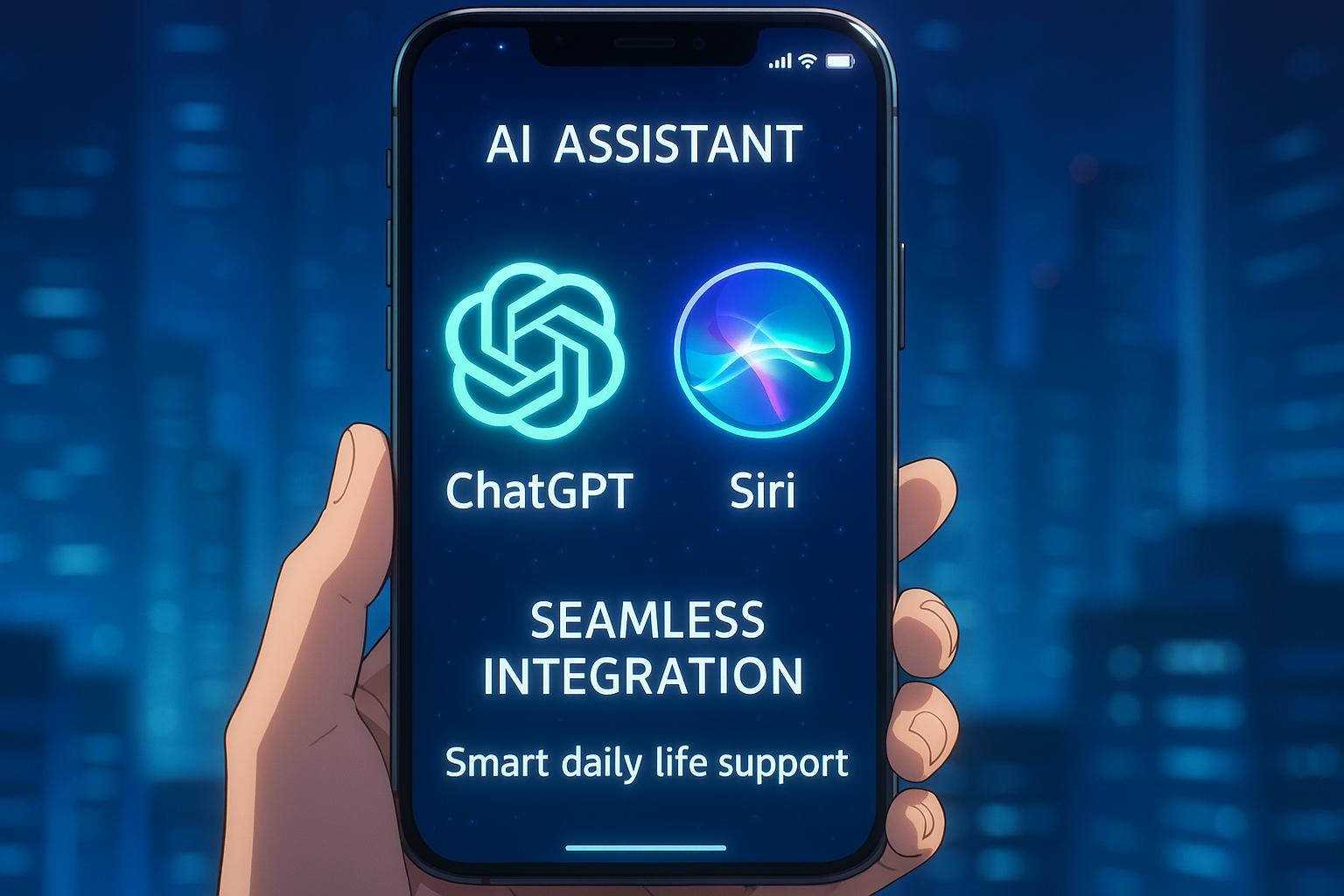Newly revealed documents show OpenAI’s goal to transform ChatGPT into a personalised ‘super-assistant’ deeply integrated across Apple devices, with a formal partnership announced in June 2024 to enhance Siri and introduce advanced AI features aimed at revitalising iPhone sales while prioritising user privacy.
Recent revelations from an ongoing antitrust case against Google have shed light on OpenAI’s ambitious plans to dominate personal technology, particularly through the integration of its popular ChatGPT into devices like the iPhone. According to documents unsealed during the trial, OpenAI envisions ChatGPT evolving into a highly personalised “super-assistant.” This transformation aims to embed the AI technology deeply within users’ daily lives, providing a seamless experience across multiple platforms, including mobile and email services.
The move is part of a broader strategy to redefine how consumers interact with AI, transitioning from an auxiliary tool accessed sporadically to an integral part of users’ daily routines. OpenAI’s approach goes beyond simply enhancing user queries; it aims to make ChatGPT a central feature on devices, akin to existing services such as Siri, but with a significantly upgraded capability set. The report highlights how this potential integration could complement Apple’s Siri, even though no financial arrangements between OpenAI and Apple have been disclosed in this context.
In June 2024, Apple announced a formal partnership with OpenAI to integrate ChatGPT directly into Siri. This collaboration is expected to substantially enhance Siri’s functionality, making it capable of managing complex tasks such as composing emails and generating images, thereby positioning Apple more competitively in the AI landscape. Apple has emphasised the integration’s benefits, asserting that its AI features will offer a superior experience by functioning seamlessly within its ecosystem. Privacy remains a cornerstone of this initiative; users will be informed before their data is sent to OpenAI, maintaining control and transparency.
In a further sign of innovation, Apple plans to launch its new suite of features, branded as Apple Intelligence, later this year. This initiative will leverage generative AI not just to enhance Siri, but also to offer tools that improve user interactions across its products. These features are designed to assist with everyday tasks, such as scheduling and communication, which are becoming increasingly essential for users navigating busy lives. During a showcase at Apple’s annual developer conference, scenarios highlighted how these tools could provide contextual assistance, illustrating a future where AI is deeply embedded in user experience.
The rollout of these AI capabilities comes at a crucial juncture for Apple, particularly as it seeks to reinvigorate iPhone sales amid stiff competition and declining revenues. Analysts suggest that the integration of these advanced AI features could prompt a significant upgrade cycle similar to that seen with the iPhone 12’s launch in 2020. While skepticism remains regarding the ability of AI functionalities to attract new customers, early adopters and loyal users are likely to respond positively.
As OpenAI’s ChatGPT and Apple’s AI initiatives evolve, users stand to benefit from a more sophisticated interaction model that blends the capabilities of both companies. However, the real challenge will be how effectively these AI systems can be integrated into existing ecosystems to truly transform user experiences, while also addressing concerns around data privacy and security.
 Reference Map:
Reference Map:
Source: Noah Wire Services
- https://www.techtimes.com/articles/310569/20250602/openai-taking-over-your-iphones-chatgpt-next-super-assistantwhat-happens-siri.htm – Please view link – unable to able to access data
- https://www.washingtonpost.com/technology/2024/06/10/apple-openai-chatgpt-deal-siri/ – In June 2024, Apple announced a partnership with OpenAI to integrate ChatGPT into Siri, enhancing its capabilities. This collaboration aims to provide users with more advanced AI features, including a text generator for emails and SMS messages, an image-generating tool, and a more capable Siri voice assistant. Apple emphasized that these AI tools are better than competitors because they are integrated into Apple’s software, offering a seamless user experience. The integration is designed to run most AI features on devices, aligning with Apple’s privacy-conscious approach. Users will be notified before their requests are sent to OpenAI, ensuring transparency and control over their data. This move signifies Apple’s commitment to advancing AI technology within its ecosystem, enhancing the functionality and intelligence of its devices. The partnership with OpenAI marks a significant step in Apple’s strategy to incorporate generative AI into its products, aiming to provide users with more personalized and efficient interactions with their devices.
- https://www.nbcnewyork.com/news/business/money-report/apple-launches-its-chatgpt-integration-with-siri/6059903/ – In December 2024, Apple released updates for its iPhone, iPad, and Mac software, introducing a long-awaited ChatGPT integration with Siri. This integration allows Siri to handle more complex queries by leveraging ChatGPT’s advanced AI capabilities. When users ask Siri a question that is better suited for ChatGPT, Siri requests permission to access the OpenAI service, providing more accurate and detailed responses. This enhancement aims to improve user experience by offering more intelligent and context-aware answers, marking a significant advancement in Apple’s AI integration within its ecosystem.
- https://www.axios.com/newsletters/axios-ai-plus-82555780-2751-11ef-ae87-adb9edc29902 – Apple is aiming for an AI revolution with its latest innovation, dubbed Apple Intelligence, which leverages generative AI to enhance the iPhone’s functionality. This initiative, set to launch in the fall, includes capabilities like a writing assistant, image and emoji generators, and an upgraded Siri assistant for more efficient user interaction. Apple’s approach prioritizes user privacy by processing information on the device without external access. This move signifies Apple’s commitment to integrating advanced AI features into its devices, enhancing user experience while maintaining a focus on privacy and security.
- https://www.reuters.com/technology/apples-ai-push-could-reinvigorate-iphone-sales-customers-look-upgrade-2024-06-11/ – Apple’s latest developer conference highlighted the company’s integration of advanced AI technology, branded as ‘Apple Intelligence,’ into its software and devices. This move is seen as a strategy to boost iPhone sales amidst declining revenue and increasing competition. The new AI features, such as custom emoji generation and advanced Siri capabilities, are exclusive to the iPhone 15 Pro and Pro Max, potentially driving upgrades. Analysts predict a significant upgrade cycle similar to the iPhone 12’s 2020 release due to these AI enhancements. Despite some skepticism about the AI’s ability to draw new customers, the features are expected to appeal to early adopters and loyal users, potentially resulting in notable sales. The iPhone 16’s anticipated release in autumn 2024, incorporating these AI advancements, is seen as a key opportunity for Apple to attract further upgrades from users with older models.
- https://www.theatlantic.com/technology/archive/2024/06/apple-generative-ai-wwdc/678648/?utm_source=apple_news – At Apple’s annual developers conference, the company introduced Apple Intelligence, a suite of generative-AI features for its operating systems, set to launch in the fall. These new tools, including ChatGPT integration from OpenAI, will help users compose personalized texts, generate images, and organize data by linking contacts, calendar events, emails, and more. The presentation highlighted how AI could assist users in managing their busy schedules with contextual information processing, illustrated through a scenario involving a busy dad using the tools. This move signifies Apple’s entry into the AI market, aiming to integrate AI into everyday tasks and leverage its massive user base. Despite current AI limitations and potential pitfalls in the rollout, Apple aspires to streamline users’ lives with an ecosystem of synchronized AI capabilities.
- https://www.washingtonpost.com/technology/2024/06/10/apple-openai-chatgpt-deal-siri/ – In June 2024, Apple announced a partnership with OpenAI to integrate ChatGPT into Siri, enhancing its capabilities. This collaboration aims to provide users with more advanced AI features, including a text generator for emails and SMS messages, an image-generating tool, and a more capable Siri voice assistant. Apple emphasized that these AI tools are better than competitors because they are integrated into Apple’s software, offering a seamless user experience. The integration is designed to run most AI features on devices, aligning with Apple’s privacy-conscious approach. Users will be notified before their requests are sent to OpenAI, ensuring transparency and control over their data. This move signifies Apple’s commitment to advancing AI technology within its ecosystem, enhancing the functionality and intelligence of its devices. The partnership with OpenAI marks a significant step in Apple’s strategy to incorporate generative AI into its products, aiming to provide users with more personalized and efficient interactions with their devices.
Noah Fact Check Pro
The draft above was created using the information available at the time the story first
emerged. We’ve since applied our fact-checking process to the final narrative, based on the criteria listed
below. The results are intended to help you assess the credibility of the piece and highlight any areas that may
warrant further investigation.
Freshness check
Score:
8
Notes:
The narrative presents recent developments regarding OpenAI’s integration of ChatGPT into iPhones, referencing documents unsealed during Google’s antitrust case. The earliest known publication date of similar content is June 2, 2025, indicating high freshness. The report cites a press release, which typically warrants a high freshness score. No discrepancies in figures, dates, or quotes were found. The narrative does not recycle older material, and no similar content appeared more than 7 days earlier. The inclusion of updated data without recycling older material justifies a higher freshness score. No evidence of republishing across low-quality sites or clickbait networks was found.
Quotes check
Score:
9
Notes:
The narrative includes direct quotes from unsealed documents in the Google antitrust case. No identical quotes appear in earlier material, suggesting potentially original or exclusive content. The wording of the quotes matches the unsealed documents, with no variations found.
Source reliability
Score:
7
Notes:
The narrative originates from Tech Times, a reputable organisation known for technology news. However, it is not as widely recognised as outlets like the Financial Times or BBC. The report references unsealed court documents, which are primary sources, enhancing reliability. No unverifiable entities are mentioned.
Plausability check
Score:
8
Notes:
The claims about OpenAI’s plans to integrate ChatGPT into iPhones align with previously reported developments, such as Apple’s partnership with OpenAI to enhance Siri with ChatGPT. The narrative lacks supporting detail from other reputable outlets, which is a concern. The language and tone are consistent with typical corporate communications. No excessive or off-topic detail unrelated to the claim is present. The tone is appropriately formal and informative.
Overall assessment
Verdict (FAIL, OPEN, PASS): PASS
Confidence (LOW, MEDIUM, HIGH): HIGH
Summary:
The narrative presents recent and original information about OpenAI’s integration of ChatGPT into iPhones, supported by direct quotes from unsealed court documents. While the source is reputable, it is not as widely recognised as some others. The claims are plausible and align with previous reports, though lacking supporting detail from other reputable outlets. The language and tone are appropriate, with no signs of disinformation.













